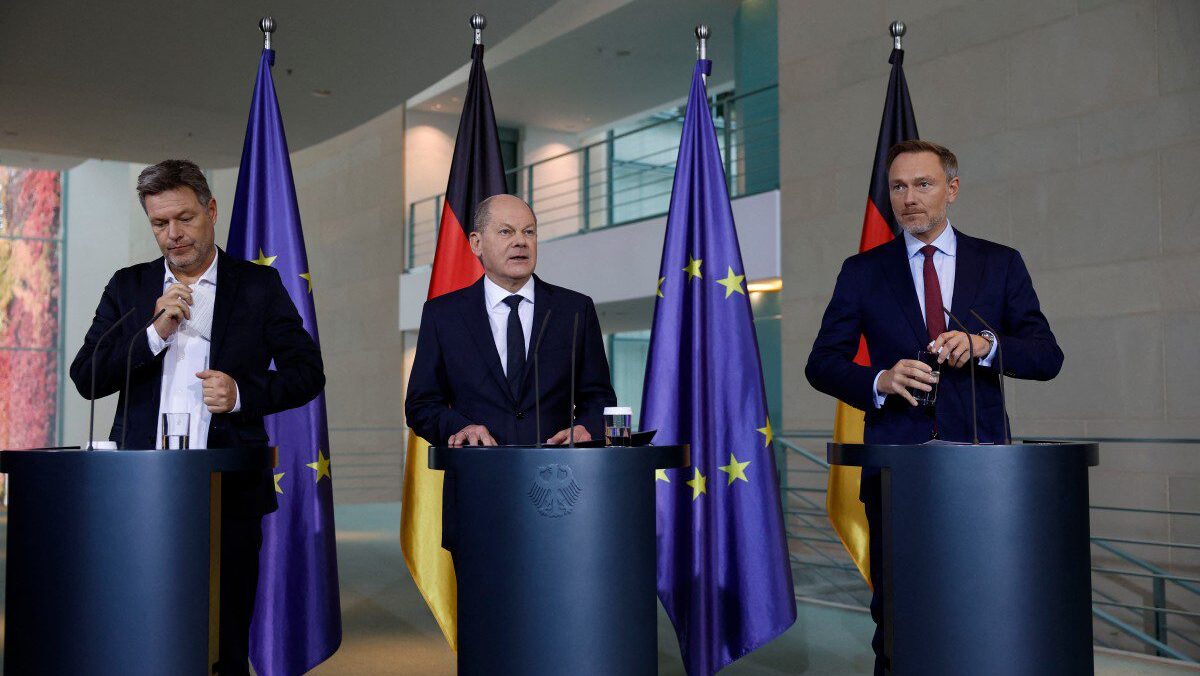
(LtoR) German Minister of Economics and Climate Protection Robert Habeck, German Chancellor Olaf Scholz, and German Finance Minister Christian Lindner.
Photo by Odd ANDERSEN / AFP
Germany’s traffic light coalition on Monday, November 27th, presented their suggested solution to the country’s budget woes in a supplementary budget that would, for the fourth year in a row, suspend the debt brake, along with cutting spending by €15.1 billion and borrowing an additional €43.2 billion. The debt brake is intended to limit the ability of the government to take on new debt.
The proposal, which will have to be approved by the Bundestag, is sure to prompt additional debate as even the FDP, part of Chancellor Scholz’s coalition government, is opposing extending the suspension of the debt brake.
The country’s top court ruled on November 15th that a move to redirect €60 billion of unused loans meant to combat the effects of the pandemic to a climate fund was unconstitutional. In December 2021, the coalition of Social Democrats, Greens, and the liberal FDP agreed to transfer €60 billion of untapped credit to its so-called climate and transformation fund. As Deutsche Welle explains, this is a special fund, separate from the normal federal budget, that finances measures for climate protection, including support for the renovation of old housing stock and oil and gas heating systems.
The manoeuvre was made possible with the suspension of the so-called Schuldenbremse, the debt brake. Germany introduced the brake under Angela Merkel’s leadership in 2009 in the wake of the global financial crisis. The brake restricts the German public deficit to 0.35% of GDP and prohibits Germany’s sixteen federal states from running any deficits. It has helped Germany to balance the consolidated public sector budget, and by 2019, its debt-to-GDP ratio had dropped below the 60% threshold called for in the Maastricht Treaty. The debt brake was suspended because of the pandemic from 2020 to 2022—the government is allowed to do so in the event of “exceptional emergencies” to finance its response. The suspension remained at the start of the war in Ukraine last year when huge cuts in Russian gas exports led to a drastic increase in Europe’s energy costs. This allowed the government to borrow billions of euros in emergency loans.
However, the constitutional court has made it clear that setting aside these loans for the future and spending them in ways not approved by the Bundestag is not permissible. Finance Minister and FDP leader Christian Lindner imposed a budget freeze last week, as it is not clear whether another special fund falls into the same category as the climate fund. The €200 billion Economic Stabilisation Fund, which is now also under scrutiny, was set up at the start of the pandemic to help companies affected by lockdowns. After the start of the war in Ukraine, the fund was repurposed to aid companies and consumers struggling with higher energy bills. Some €37 billion has been drawn down from the fund this year, in part to finance a cap on gas and electricity prices.
Economists believe that Europe’s largest economy has already suffered years of chronic underinvestment, contributing to its current stagnation. Since the COVID pandemic, the German economy has recorded the lowest economic growth in the euro zone, while other countries have been taking on debt to bolster their economies.
Just like the fiscally conservative FDP, the opposition centre-right CDU/CSU alliance strongly opposes another year of suspended debt brake.
“Every finance minister could in the future accumulate unlimited debt in a crisis year, but then use the money later for completely different purposes and for an unlimited period of time in other years,” said Mathias Middelberg, of the CDU/CSU parliamentary group. CDU leader Friedrich Merz has instead proposed cutting social spending and postponing the Green party’s heating bill, which aims to accelerate the phasing out of fossil fuels.
However, Economy Minister Robert Habeck of the Greens stressed that the debt brake was introduced at a time “when climate protection was not taken seriously, wars were a thing of the past, China was our cheap workbench.” He added: “With the debt brake as it is, we have voluntarily tied our hands behind our backs and are going into a boxing match.” Proponents of reform are growing more vocal within the Social Democrats as well.
